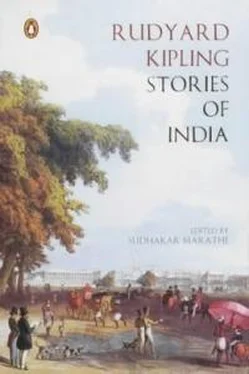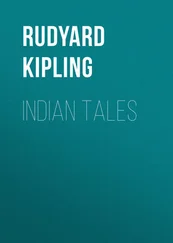Джозеф Киплинг - Indian Tales
Здесь есть возможность читать онлайн «Джозеф Киплинг - Indian Tales» весь текст электронной книги совершенно бесплатно (целиком полную версию без сокращений). В некоторых случаях можно слушать аудио, скачать через торрент в формате fb2 и присутствует краткое содержание. Год выпуска: 2014, Издательство: epubBooks Classics, Жанр: Классическая проза, на английском языке. Описание произведения, (предисловие) а так же отзывы посетителей доступны на портале библиотеки ЛибКат.
- Название:Indian Tales
- Автор:
- Издательство:epubBooks Classics
- Жанр:
- Год:2014
- ISBN:нет данных
- Рейтинг книги:5 / 5. Голосов: 1
-
Избранное:Добавить в избранное
- Отзывы:
-
Ваша оценка:
- 100
- 1
- 2
- 3
- 4
- 5
Indian Tales: краткое содержание, описание и аннотация
Предлагаем к чтению аннотацию, описание, краткое содержание или предисловие (зависит от того, что написал сам автор книги «Indian Tales»). Если вы не нашли необходимую информацию о книге — напишите в комментариях, мы постараемся отыскать её.
Indian Tales — читать онлайн бесплатно полную книгу (весь текст) целиком
Ниже представлен текст книги, разбитый по страницам. Система сохранения места последней прочитанной страницы, позволяет с удобством читать онлайн бесплатно книгу «Indian Tales», без необходимости каждый раз заново искать на чём Вы остановились. Поставьте закладку, и сможете в любой момент перейти на страницу, на которой закончили чтение.
Интервал:
Закладка:
"How is he chained?"
"With an iron band round his waist fixed to the bench he sits on, and a sort of handcuff on his left wrist chaining him to the oar. He's on the lower deck where the worst men are sent, and the only light comes from the hatchways and through the oar–holes. Can't you imagine the sunlight just squeezing through between the handle and the hole and wobbling about as the ship moves?"
"I can, but I can't imagine your imagining it."
"How could it be any other way? Now you listen to me. The long oars on the upper deck are managed by four men to each bench, the lower ones by three, and the lowest of all by two. Remember, it's quite dark on the lowest deck and all the men there go mad. When a man dies at his oar on that deck he isn't thrown overboard, but cut up in his chains and stuffed through the oar–hole in little pieces."
"Why?" I demanded, amazed, not so much at the information as the tone of command in which it was flung out.
"To save trouble and to frighten the others. It needs two overseers to drag a man's body up to the top deck; and if the men at the lower deck oars were left alone, of course they'd stop rowing and try to pull up the benches by all standing up together in their chains."
"You've a most provident imagination. Where have you been reading about galleys and galley–slaves?"
"Nowhere that I remember. I row a little when I get the chance. But, perhaps, if you say so, I may have read something."
He went away shortly afterward to deal with booksellers, and I wondered how a bank clerk aged twenty could put into my hands with a profligate abundance of detail, all given with absolute assurance, the story of extravagant and bloodthirsty adventure, riot, piracy, and death in unnamed seas. He had led his hero a desperate dance through revolt against the overseers, to command of a ship of his own, and ultimate establishment of a kingdom on an island "somewhere in the sea, you know"; and, delighted with my paltry five pounds, had gone out to buy the notions of other men, that these might teach him how to write. I had the consolation of knowing that this notion was mine by right of purchase, and I thought that I could make something of it.
When next he came to me he was drunk—royally drunk on many poets for the first time revealed to him. His pupils were dilated, his words tumbled over each other, and he wrapped himself in quotations. Most of all was he drunk with Longfellow.
"Isn't it splendid? Isn't it superb?" he cried, after hasty greetings. "Listen to this—
"'Wouldst thou,'—so the helmsman answered,
'Know the secret of the sea?
Only those who brave its dangers
Comprehend its mystery.'"
By gum!
"'Only those who brave its dangers
Comprehend its mystery,'"
he repeated twenty times, walking up and down the room and forgetting me. "But I can understand it too," he said to himself. "I don't know how to thank you for that fiver, And this; listen—
"'I remember the black wharves and the ships
And the sea–tides tossing free,
And the Spanish sailors with bearded lips,
And the beauty and mystery of the ships,
And the magic of the sea.'"
I haven't braved any dangers, but I feel as if I knew all about it."
"You certainly seem to have a grip of the sea. Have you ever seen it?"
"When I was a little chap I went to Brighton once; we used to live in Coventry, though, before we came to London. I never saw it,
"'When descends on the Atlantic
The gigantic
Storm–wind of the Equinox.'"
He shook me by the shoulder to make me understand the passion that was shaking himself.
"When that storm comes," he continued, "I think that all the oars in the ship that I was talking about get broken, and the rowers have their chests smashed in by the bucking oar–heads. By the way, have you done anything with that notion of mine yet?"
"No. I was waiting to hear more of it from you. Tell me how in the world you're so certain about the fittings of the ship. You know nothing of ships."
"I don't know. It's as real as anything to me until I try to write it down. I was thinking about it only last night in bed, after you had loaned me 'Treasure Island'; and I made up a whole lot of new things to go into the story."
"What sort of things?"
"About the food the men ate; rotten figs and black beans and wine in a skin bag, passed from bench to bench."
"Was the ship built so long ago as that ?"
"As what? I don't know whether it was long ago or not. It's only a notion, but sometimes it seems just as real as if it was true. Do I bother you with talking about it?"
"Not in the least. Did you make up anything else?"
"Yes, but it's nonsense." Charlie flushed a little.
"Never mind; let's hear about it."
"Well, I was thinking over the story, and after awhile I got out of bed and wrote down on a piece of paper the sort of stuff the men might be supposed to scratch on their oars with the edges of their handcuffs. It seemed to make the thing more lifelike. It is so real to me, y'know."
"Have you the paper on you?"
"Ye–es, but what's the use of showing it? It's only a lot of scratches. All the same, we might have 'em reproduced in the book on the front page."
"I'll attend to those details. Show me what your men wrote."
He pulled out of his pocket a sheet of note–paper, with a single line of scratches upon it, and I put this carefully away.
"What is it supposed to mean in English?" I said.
"Oh, I don't know. Perhaps it means 'I'm beastly tired.' It's great nonsense," he repeated, "but all those men in the ship seem as real as people to me. Do do something to the notion soon; I should like to see it written and printed."
"But all you've told me would make a long book."
"Make it then. You've only to sit down and write it out."
"Give me a little time. Have you any more notions?"
"Not just now. I'm reading all the books I've bought. They're splendid."
When he had left I looked at the sheet of note–paper with the inscription upon it. Then I took my head tenderly between both hands, to make certain that it was not coming off or turning round. Then … but there seemed to be no interval between quitting my rooms and finding myself arguing with a policeman outside a door marked Private in a corridor of the British Museum. All I demanded, as politely as possible, was "the Greek antiquity man." The policeman knew nothing except the rules of the Museum, and it became necessary to forage through all the houses and offices inside the gates. An elderly gentleman called away from his lunch put an end to my search by holding the note–paper between finger and thumb and sniffing at it scornfully.
"What does this mean? H'mm," said he. "So far as I can ascertain it is an attempt to write extremely corrupt Greek on the part"—here he glared at me with intention—"of an extremely illiterate—ah—person." He read slowly from the paper, " Pollock, Erckmann, Tauchnitz, Henniker "–four names familiar to me.
"Can you tell me what the corruption is supposed to mean—the gist of the thing?" I asked.
"I have been—many times—overcome with weariness in this particular employment. That is the meaning." He returned me the paper, and I fled without a word of thanks, explanation, or apology.
I might have been excused for forgetting much. To me of all men had been given the chance to write the most marvelous tale in the world, nothing less than the story of a Greek galley–slave, as told by himself. Small wonder that his dreaming had seemed real to Charlie. The Fates that are so careful to shut the doors of each successive life behind us had, in this case, been neglectful, and Charlie was looking, though that he did not know, where never man had been permitted to look with full knowledge since Time began. Above all, he was absolutely ignorant of the knowledge sold to me for five pounds; and he would retain that ignorance, for bank–clerks do not understand metempsychosis, and a sound commercial education does not include Greek. He would supply me—here I capered among the dumb gods of Egypt and laughed in their battered faces—with material to make my tale sure—so sure that the world would hail it as an impudent and vamped fiction. And I—I alone would know that it was absolutely and literally true. I—I alone held this jewel to my hand for the cutting and polishing. Therefore I danced again among the gods till a policeman saw me and took steps in my direction.
Читать дальшеИнтервал:
Закладка:
Похожие книги на «Indian Tales»
Представляем Вашему вниманию похожие книги на «Indian Tales» списком для выбора. Мы отобрали схожую по названию и смыслу литературу в надежде предоставить читателям больше вариантов отыскать новые, интересные, ещё непрочитанные произведения.
Обсуждение, отзывы о книге «Indian Tales» и просто собственные мнения читателей. Оставьте ваши комментарии, напишите, что Вы думаете о произведении, его смысле или главных героях. Укажите что конкретно понравилось, а что нет, и почему Вы так считаете.












